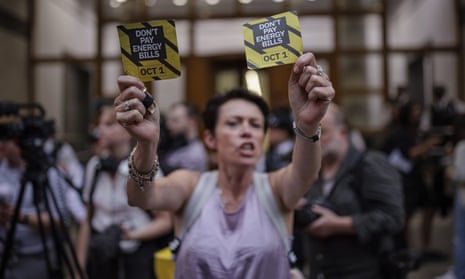The energy crisis is hitting UK household budgets harder than any country in western Europe, according to analysis by the International Monetary Fund. The difference between the cost burden on poor and rich households is also far more unequal in the UK compared with other countries.
The reason is the UK’s heavy reliance on gas to heat homes and produce electricity at a time when Russia’s war in Ukraine has sent gas prices soaring. In addition, the UK has the least energy efficient homes in western Europe.
There is widespread agreement from energy experts on the best solutions: a large-scale and rapid insulation programme and a faster rollout of wind and solar energy, which produce electricity that is currently about nine times cheaper than that from gas, as well as short-term financial support for bill-payers. The government has consistently failed over the past decade to deliver major insulation programmes and has effectively banned onshore wind.
The IMF analysis assessed the impact of the energy crisis expected over the whole of 2022, based on forward fossil fuel prices in May, since when prices have risen. It found that the average UK household is expected to lose 8.3% of its total spending power in 2022, as a result of having to pay higher energy bills. The figure in Germany and Spain is 4%, while only Estonian and Czech households face higher impacts than the UK in the whole of Europe.
Energy bill rises also push up the costs of other goods, as sellers pass on the price rises. These indirect effects will knock another 2% off the money UK households have to spend in 2022. The IMF analysis takes account of people reducing their energy use as prices rise.
“The distributional impact is especially skewed [in the UK],” said Oya Celasun from the IMF. The poorest 10% of UK households are expected to spend 17.8% of their budget on energy in 2022, while the richest 10% will spend 6.1%, the analysis found. The difference of 11.7 percentage points is by far the greatest disparity among the 25 European countries assessed. In France, the difference is 3.9 percentage points and in the Netherlands, 2.5.
Analysis by Deutsche Bank also shows UK bill-payers are being hit hard by the energy crisis. It found that consumer price inflation for gas and electricity in the UK in 2022 is forecast to be about 80%, compared with an average of 40% across the 19 countries that use the euro.
“The UK has higher energy prices, comparative to other economies in Europe” said Sanjay Raja, the chief UK economist at Deutsche Bank. “The fact of the matter is the UK is more highly dependent on gas.”
The vast majority of homes in the UK – 85% – use gas to provide heat, a legacy of exploitation of North Sea gas fields, which are now in decline. In France and Germany, fewer than 50% of homes are heated with gas.
The UK also relied on gas to produce more terawatt hours of electricity in 2021 than any of the 39 European countries analysed by the thinktank Ember, except Italy. Electricity from gas is the most expensive for power and sets the price for all electricity, due to the current UK market structure.
In terms of the share of electricity generated by gas, the UK is at 40%, Germany at 15% and Denmark at 6%. “The UK energy crisis is a fossil gas crisis,” said Sarah Brown at Ember. “The UK’s reliance on fossil gas is punishing ordinary people.”
after newsletter promotion
“Another of the key differences is that houses in the UK are incredibly inefficient,” said Lisa Fischer at the thinktank E3G. The UK’s leaky homes are the least efficient in western Europe, according to one analysis: UK homes lose 3C in temperature in the same time that German homes lose just 1C. The people living in the two-thirds of UK homes that are energy inefficient, rated D or worse, will pay at least £1,000 more this winter.
The solution to the UK’s energy crisis is much better insulation, replacing gas boilers with heat pumps and speeding up the deployment of renewable energy, said Raja. Short-term measures include reducing the flow temperature on condensing gas boilers and replacing home appliances with more energy-efficient models, said Fischer.
Further financial support for UK households will also be necessary, but Celasun, at the IMF, said this should be targeted at vulnerable households: “For instance, it would be full compensation for the poor and support could be reduced gradually as incomes rise.” She said completely compensating price increases for everyone would remove a strong incentive to consume less energy, which cuts both costs and climate heating carbon emissions.
Jess Ralston, at the Energy and Climate Intelligence Unit, said: “The government currently has no serious plan for cutting our gas dependency, so the new prime minister would need to rapidly ramp up existing energy efficiency programmes. With the gas price so high, the return on this investment would be extraordinarily quick.”
Increasing the supply of gas from the North Sea would not result in sufficient amounts to reduce energy prices, which are set internationally, said Raja: “When it comes to the UK and energy, we are price-takers.” Fischer also dismissed the idea that fracking in the UK could alleviate the energy crisis, describing it as “nonsense”.
“It’s really important to start planning action now, because we know that next winter is likely to be at least as difficult, if not more difficult than this winter,” Fischer said. “Germany is starting to line up things, especially on financing for building efficiency and switching to heat pumps. In the UK, there’s an absolute lack of trying to do those things that help you permanently insulate people from higher energy prices.”
